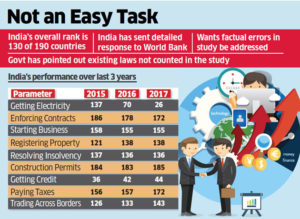 The government expects a double-digit improvement in India’s rank in the global index on ease of doing business, likely to be announced by the World Bank next month.
The government expects a double-digit improvement in India’s rank in the global index on ease of doing business, likely to be announced by the World Bank next month.
A senior official told ET that the World Bank had shared its feedback, stating that it had accepted many of the reforms claimed by the government. Last year, India’s rank had improved by just one spot to 130 among 190 countries.
“The World Bank has acknowledged around 20 reforms among many more mentioned by us in response to their study … The overall ranking will depend on how other countries have performed, but we should come close to the 100 mark,” the official said.
The World Bank had recently finished gathering feedback from users for its Doing Business Report. The cut-off date for implementing reforms for the study was June 1. Reforms implemented thereafter will not be counted for this year’s ranking.
Reforms such as GST have not been taken into account as the impact is yet to be felt by users. But India is expecting these to reflect in next year’s report and significantly boost the country’s position.
India had showed one of its poorest performances on the parameter of ‘Paying Taxes’ last time, ranking 172 among the countries surveyed for the report. That, along with an equally lower position in ‘Enforcing Contracts’, landed India at the 130th spot, falling behind countries such as Mexico (38), Russia (51) and Pakistan (138). The ranking considers business environment in Delhi and Mumbai.
Over the past few months, the government has taken up concerns about not getting due credit for its reform drive with the World Bank. While responding to the survey this year, the government flagged such issues citing examples of reforms undertaken for enforcing contracts, starting business and issuing construction permits, among other things.
The government also cited provisions in the existing legal framework that deal effectively with the issue of enforcing contracts.
ET View: Push legal reforms
The way ahead is to push reforms. India fares poorly, for example, in enforcing contracts. We need judicial reforms to drastically reduce legal delays. So, even if states improve lower courts, disputes could end up in the higher judiciary and the reform lies with the Centre. The Department of Justice should drive the reforms. The need is also to enhance transparency in funding of political parties. It will weed out corruption that will automatically improve ease of doing business.
Read more at: The Economic Times



